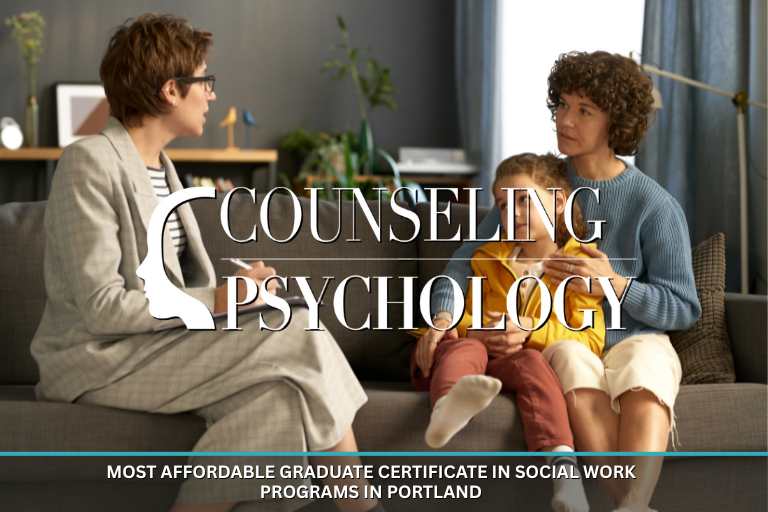Most Affordable Graduate Certificate in Social Work Programs near Portland

With Portland’s rising demand for qualified social workers and mental health professionals, graduate certificate programs in social work offer a valuable path for career advancement without the time or cost of a full graduate degree. These short, targeted programs are designed for working professionals looking to upskill, meet licensure requirements, or transition into social work from related fields like psychology, education, or criminal justice. In a city known for its strong sense of community and progressive social policies, choosing a cost-effective certificate program in Portland can be a smart investment in both personal development and long-term career potential.
According to the U.S. Bureau of Labor Statistics, employment for social workers is projected to grow 7% through 2032—faster than the average for all occupations. Portland’s emphasis on mental health services, housing support, and equitable community development creates a wide range of opportunities for trained professionals. The city's local governments, school systems, nonprofit organizations, and healthcare providers increasingly seek individuals who can bring advanced training to frontline and leadership roles. Whether the goal is licensure, a new role, or expanded impact, Portland-based graduate certificate programs offer the targeted education and flexibility to support professional growth—without breaking the bank.
2025 Top Affordable Graduate Certificate in Social Work Programs in Portland
| Rank | School & Location | Graduate Certificate | Delivery Format | Credits | Typical Length | Key Features |
| 1 | Portland State University (Portland, OR) | Gerontology | Fully Online or Hybrid | 18 | ≈ 1 year | Internship/research project option; interdisciplinary aging curriculum; no GRE requirement (pdx.edu) |
| 2 | Lewis & Clark College (Portland, OR) | Eating Disorders Treatment | Fully Online (weekend/async mix) | 9 | ≤ 10 months | Nine short courses; small cohorts; IAEDP certification-aligned; practitioner faculty (graduate.lclark.edu) |
| 3 | Portland State University (Portland, OR) | Infant/Toddler Mental Health | 100 % Online | 20 | ≈ 1 year | Relationship-based cohort; supports 0-3 mental-health specialists; no GRE (pdx.edu) |
| 4 | George Fox University (Newberg, OR) | School Social Work Licensure Prep | Hybrid (shifts mostly online '25) | 15 | 8 months | Meets Oregon TSPC licensure; ~400-hr K-12 practicum; $794/credit; MSW or post-MSW path (georgefox.edu) |
| 5 | Pacific University (Forest Grove, OR) | Gerontology | Fully Online | 15 | 9 – 15 months | No-residency; geared to working pros; healthcare-administration perspective; no GRE (catalog.pacificu.edu) |
Why Choose a Graduate Certificate in Social Work in Portland?
Portland's social services landscape reflects its identity as a city rooted in civic engagement and social equity. Many local agencies focus on areas like homelessness, addiction recovery, trauma-informed care, and school-based mental health—all fields where advanced training in social work can make a critical difference. Graduate certificate programs enable professionals to quickly gain credentials in specialized areas while continuing to work.
In addition to their professional focus, these programs are shaped by the region's progressive values. Portland is home to numerous nonprofits and public health initiatives designed to address systemic issues such as racial equity, LGBTQ+ advocacy, and sustainable community development. Certificate programs often embed these priorities into their curriculum, preparing students not just to work in the field, but to lead and innovate within it.
These factors highlight why Portland stands out as an ideal location for career-focused, affordable social work education.
- Local job relevance: Certificate programs often align with the workforce needs of Multnomah County and surrounding areas.
- Flexible formats: Many programs offer online or hybrid delivery, supporting students balancing work and family obligations.
- Affordable options: Portland institutions provide cost-effective certificates compared to full-length master's programs, with options for in-state tuition or employer tuition reimbursement.
- Professional development: Certificates can lead to expanded responsibilities, salary increases, or eligibility for state licensure in Oregon.
- Pathway to advanced roles: Graduates are often better positioned for supervisory positions, program management, or specialized clinical practice.
What You Can Expect From These Programs
Graduate certificates generally include 12 to 18 credits and focus on one area of specialization. Portland's programs frequently cover topics like trauma-informed care, mental health interventions, school social work, clinical supervision, and community advocacy.
Programs are typically structured for working professionals. Many are offered in part-time formats, enabling students to complete coursework in under 12 months without interrupting their employment. Some allow credits to be applied toward a future MSW degree, offering a stepping stone toward more advanced education. Practicum or fieldwork may be optional but can enhance a resume and build valuable local connections. Some programs also integrate capstone projects or portfolio development to help students demonstrate applied skills to employers.
Learning outcomes often include advanced understanding of social justice frameworks, cross-cultural communication, program evaluation, and systems thinking—skills highly sought by employers in Portland's diverse nonprofit and public service sectors.
Career Impact and Licensure in Oregon
A graduate certificate can be a strategic step toward meeting Oregon's licensure requirements. Clinical certificates, for instance, support MSW holders in fulfilling education requirements for the Licensed Clinical Social Worker (LCSW) credential. Other certificates support professionals moving into case management, housing coordination, or behavioral health roles, especially within agencies that receive federal or state funding and require credentialed staff.
In Portland, demand is especially high for school social workers in Portland Public Schools, mental health providers in integrated clinics, and outreach professionals working in housing and addiction recovery. These roles often require or prioritize specialized credentials and continuing education. Earning a graduate certificate may also make candidates more competitive for leadership positions such as program directors, clinical supervisors, or policy analysts.
Graduates of these programs often find employment with:
- Local nonprofits such as Central City Concern and Transition Projects
- Public health departments and hospital systems
- Community mental health clinics
- Youth-serving organizations and schools
How to Choose the Right Program
When comparing certificate programs, consider accreditation, delivery format, tuition cost, and faculty connections. Look for:
- Accreditation and licensure alignment: Verify the curriculum meets Oregon Board of Licensed Social Workers requirements and supports national credentialing goals.
- Delivery format: Hybrid or online formats are ideal for working students, especially those located outside the downtown area or juggling caregiving responsibilities.
- Financial accessibility: Investigate tuition assistance, scholarships, or employer-funded education benefits. Many Portland-area organizations offer reimbursement for continuing education.
- Local engagement: Programs with instructors or alumni involved in Portland's social sector can offer stronger networking opportunities. Look for faculty who actively participate in community-based research, advocacy, or service provision.
Additional considerations may include whether a program supports multicultural competencies, offers dedicated advising services, or provides career placement assistance. Many Portland institutions also host regular networking events, job fairs, and guest speaker series that introduce students to potential employers.
Online Options for Busy Professionals
Online and hybrid formats increase accessibility for those balancing work, family, or rural living situations. Asynchronous modules allow flexibility, while synchronous sessions support engagement and networking. All featured programs support remote learners without sacrificing Portland-specific content and community connection.
Portland's schools are increasingly adapting their programs to accommodate nontraditional learners. Some certificate tracks may even be completed fully online without any in-person attendance, allowing participation from social workers across Oregon and neighboring states. These formats are especially advantageous for professionals working night shifts, managing caregiving duties, or living outside the metro area but seeking Portland-specific credentials.
Portland-Specific Resources for Social Work Students
Graduate certificate students benefit from Portland's strong social work infrastructure. Key resources include:
- Portland State University's Field Education Office – Local internships and employer connections
- Oregon NASW Chapter – Advocacy, CEUs, and licensure preparation
- Multnomah County Human Services – One of the largest regional employers
- Well-known organizations like Lines for Life, Central City Concern, and Outside In – Consistently seek qualified social work professionals
- The Coalition of Communities of Color – Offers culturally specific programming and partnership opportunities
- Oregon Health Authority Behavioral Health Division – Provides updates on licensure pathways and emerging workforce needs
Networking with local professionals, joining regional LinkedIn groups, and attending social work conferences or panels are all strategies for connecting with Portland's vibrant social work community. Many certificate programs actively encourage these types of professional engagement as part of student success.
Make an Impact Affordably and Locally
In Portland's evolving human services landscape, a graduate certificate in social work offers a strategic, affordable way to grow professionally. These programs support career changes, license advancement, and deeper community impact—without the time or cost of a full degree.
Whether the goal is to qualify for a clinical license, specialize in trauma-informed care, or expand a leadership role in a nonprofit setting, Portland offers flexible, accessible paths forward. The region's forward-thinking approach to health equity, community mental health, and inclusive education creates a high demand for social workers with focused training and a commitment to social change.
Graduate certificates make this opportunity more accessible—equipping Portland's professionals to lead, serve, and make a lasting difference.
Sources
- U.S. Bureau of Labor Statistics – Social Workers
- Oregon Board of Licensed Social Workers
- Oregon NASW Chapter
- Multnomah County Human Services
- Oregon Health Authority Behavioral Health Division



